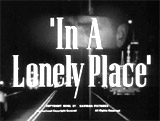
|
In a Lonely
Place (1950)
In Nicholas Ray's bleak, black and white film noir
classic about a volatile Hollywood screenwriter who became a murder
suspect and was provided an alibi by his neighbor - an aspiring actress.
It was based on a complex script by Andrew Solt:
- the world-weary, acerbic, cynical, self-destructive,
hot-tempered, depression-plagued Hollywood screenwriter and, hard-living
but laconic anti-hero Dixon Steele (Humphrey Bogart), was planning
to adapt a trashy best-selling romance novel for the big screen
- Steele's volatility was demonstrated in the opening
scene when he was driving to meet his agent Mel Lippman (Art Smith)
in Paul's Restaurant; at an intersection, he became engaged
in a road-rage incident with another motorist, and then shortly
later in a restaurant he engaged in a brief fisticuffs argument
with another man
- Dixon met simple-minded,
naive, celebrity-obsessed hat-check girl Mildred Atkinson (Martha
Stewart) at Paul's Restaurant; she was reading the novel that he would
soon be adapting into a screenplay, so instead of reading the
novel, he relied on a synopsis of the book from Mildred after she
was invited to his apartment in the late evening to provide him
with an overview of the lightweight, second-rate
book he hadn't read himself
- as they entered his apartment's courtyard, he caught
an intriguing glimpse of his upstairs, across-the-courtyard neighbor
Laurel Gray (Gloria Grahame) returning home; then later in the
evening toward the end of the long and dreary
synopsis, an unimpressed Dix retreated to his bedroom in his dressing
gown, opened his patio door, and voyeuristically noticed Laurel
ogling him - she was standing on her upstairs balcony - elevated
and framed through his window
- at 12:30 am, Dixon offered Mildred cab fare instead
of driving her home as he earlier had promised; the next morning,
at 5:00 am, Dixon was accosted at his home by Beverly Hills detective
Sgt. Brub Nicolai (Frank Lovejoy)
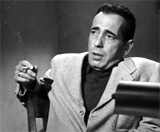
Dixon - Questioned as a Murder Suspect
|
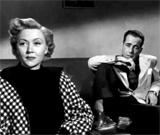
Laurel Also Brought in to be Questioned
|
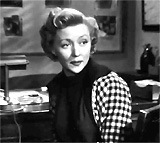
Laurel Gray Providing an Alibi for Dixon Steele
|
- Dixon was taken to the Beverly Hills Police
Department to engage in a recorded interrogation with Brub's overzealous
boss Police Captain Lochner (Carl Benton Reid); he was accused
of murdering Mildred; her strangled body had been dumped between
1:00 and 2:00 am from a moving car onto the side of the road in
Benedict Canyon; Dixon was asked why his reaction was so callous,
remorseless, and unemotional
- the beautiful but cool blonde
next-door apartment neighbor and would-be starlet Laurel Gray was
also called in for questioning in the detective's office; she provided
an alibi for Dixon: (Dixon: "She
was standing on her balcony in a negligee," AND Laurel: "I
believe he was looking at me"); she then bluntly described
why she paid attention to her new neighbor and took an interest
in him almost immediately: ("I noticed him because he looked
interesting. I like his face"); she confessed that Dixon did
not leave with the murder victim when he said goodnight to her at
his door; the question remained however - was her alibi really helpful,
since she admitted she never really saw much
- after Dixon's release, he insinuated to his agent that
he might have committed the murder, but that he was smarter and
told a better story than the investigating Police Captain: "He's
a smart fellow, that Lochner. A couple times, he almost had me.
It was his story against mine. But, of course, I told my story
better...I was smart. I covered all the angles, I have an airtight
alibi."
- later, Dixon complimented Laurel
in providing a life-saving alibi, based upon his attractive face:
("It's
a good thing you like my face. I'd have been in a lot of trouble
without you"); Laurel then gave a classic response to Dixon
when he attempted to kiss her: ("I said I liked it. I didn't
say I wanted to kiss it"); they were mutually attracted to each
other
- the next evening in an unforgettable conversational
scene during dinner with his cop and WWII buddy Brub and his wife
Sylvia (Jeff Donnell), murder suspect Dixon Steele gave a convincing
'visual' re-enactment of his version of the strangulation murder
of Mildred in his car: ("Brub, you sit down there. Sylvia, you sit
there on Brub's right. Now, you're
the killer. You're driving the car. This is the front seat...If she'd
been killed before she got in the car, the murderer would've hidden
her body in the back. In that case, he couldn't have dumped her out
without stopping. Now, you're driving up the canyon. Your left hand's
on the wheel....She's telling you she'd done nothing wrong. You pretend
to believe her. You put your right arm around her neck. You get to
a lonely place in the road, and you begin to squeeze. You're an ex-GI.
You know judo. You know how to kill a person without using your hands.
You're driving the car, and you're strangling her. You don't see
her bulging eyes or protruding tongue. Go ahead, go ahead Brub, squeeze
harder. You love her, and she's deceived you. You hate her patronizing
attitude. She looks down on you. She's impressed with celebrities.
She wants to get rid of you. Squeeze harder. Harder. Squeeze harder.
It's wonderful to feel her throat crush under your arm")
- Dix and Laurel began a love affair -
in her apartment, he kissed her, and explained how
love and redemption were interlinked with violence and death: "I've
been looking for someone for a long time. I didn't
know her name or where she lived. I'd never seen her before. When a
girl was killed - and because of that, I found what I was looking for.
Now I know your name, where you live, and how you look"
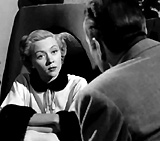
|

|
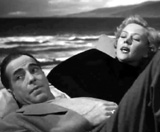
|
|
Dixon's Brief Love Affair with Laurel
|
- they temporarily
began living with each other and were happy, but tensions between
them grew when the investigation into him persisted (and he was
under secret surveillance), and she became increasingly suspicious
and began to back away; she clearly saw him as a
man whose own sur-'face' hid terrible, uncontrollable and ferocious
anger, and feared that he was violent and capable of murder - possessing
a "sick
mind with an urge to destroy"
- during a late-night scary ride in his convertible
on winding Mulholland Drive, Dixon
delivered a famed line of dialogue - a line of script written for
some future work, that he told to Laurel as she took the wheel; it
was a foreshadowing of the end of their own fragile affair: "I
was born when she kissed me. I died when she left me. I lived a few
weeks while she loved me" - she
repeated the phrase back to him - but hesitated on the last sentence;
she suggested it could be "a farewell note"; their love
was clearly threatened and breaking apart; their romantic relationship
was ultimately put to the test as she became increasingly suspicious
of his disintegrating self.
- out of fear, Laurel accepted Dixon's desperate
and sudden marriage proposal, to avoid aggravating him or getting
into an argument due to his inherent, explosive nature; however,
she was seriously contemplating leaving town to avoid marrying
him, and she hurriedly packed her bag inside her locked apartment's
bedroom to leave; Dix forced his way in to her apartment, and his
eyes widened when he realized Laurel was packing - not for a honeymoon
trip to Las Vegas - but to run away from him to New York; in a
rage, he nearly strangled the woman he loved; he was only interrupted
by a ringing telephone with a startling message, informing him
that Mildred's boyfriend Henry Kesler (Jack Reynolds) had confessed to her murder
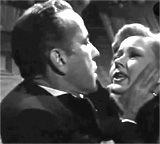
Dixon Semi-Strangling Laurel When She Was Planning to Run Away From Him
|
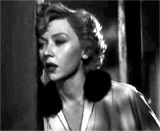
Laurel's Last Words: "I lived a few weeks
while you loved me. Goodbye, Dix"
|
- in the film's unhappy ending, it was too late to
save their relationship; Laurel uttered teary, murmured words of
goodbye to Dixon as he walked away after their relationship had
completely deteriorated, and he disappeared through an outer archway
to the street: "I
lived a few weeks while you loved me. Goodbye, Dix" - she was
repeating the bittersweet words from Dix's script while leaning wearily
on her apartment's door frame
|
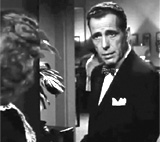
Screenwriter Dixon Steele (Humphrey Bogart)
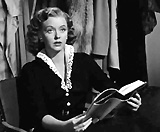
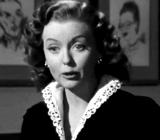
Hat-check Girl Mildred Atkinson (Martha Stewart)
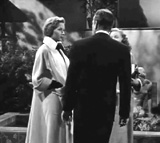
First Glimpse of Dixon's Neighbor Laurel Gray (Gloria Grahame)
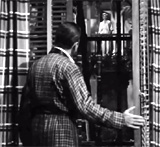
Dixon's 2nd View of Laurel On Her Balcony Across the Courtyard
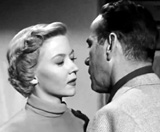
Later- Dixon's Attempt to Kiss Laurel With Her Response ("I didn't
say I wanted to kiss it")
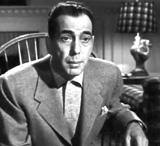
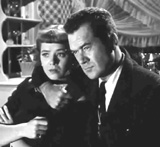
Dixon's Vivid Re-Enactment of Mildred's Strangulation
in His Car
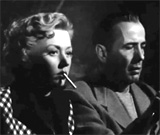
Scary Mulholland Dr. Ride
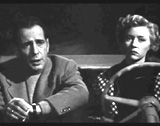
Dixon: "I
was born when she kissed me. I died when she left me.
I lived a few weeks while she loved me."

Dixon Pressuring Laurel to Marry Him
|












